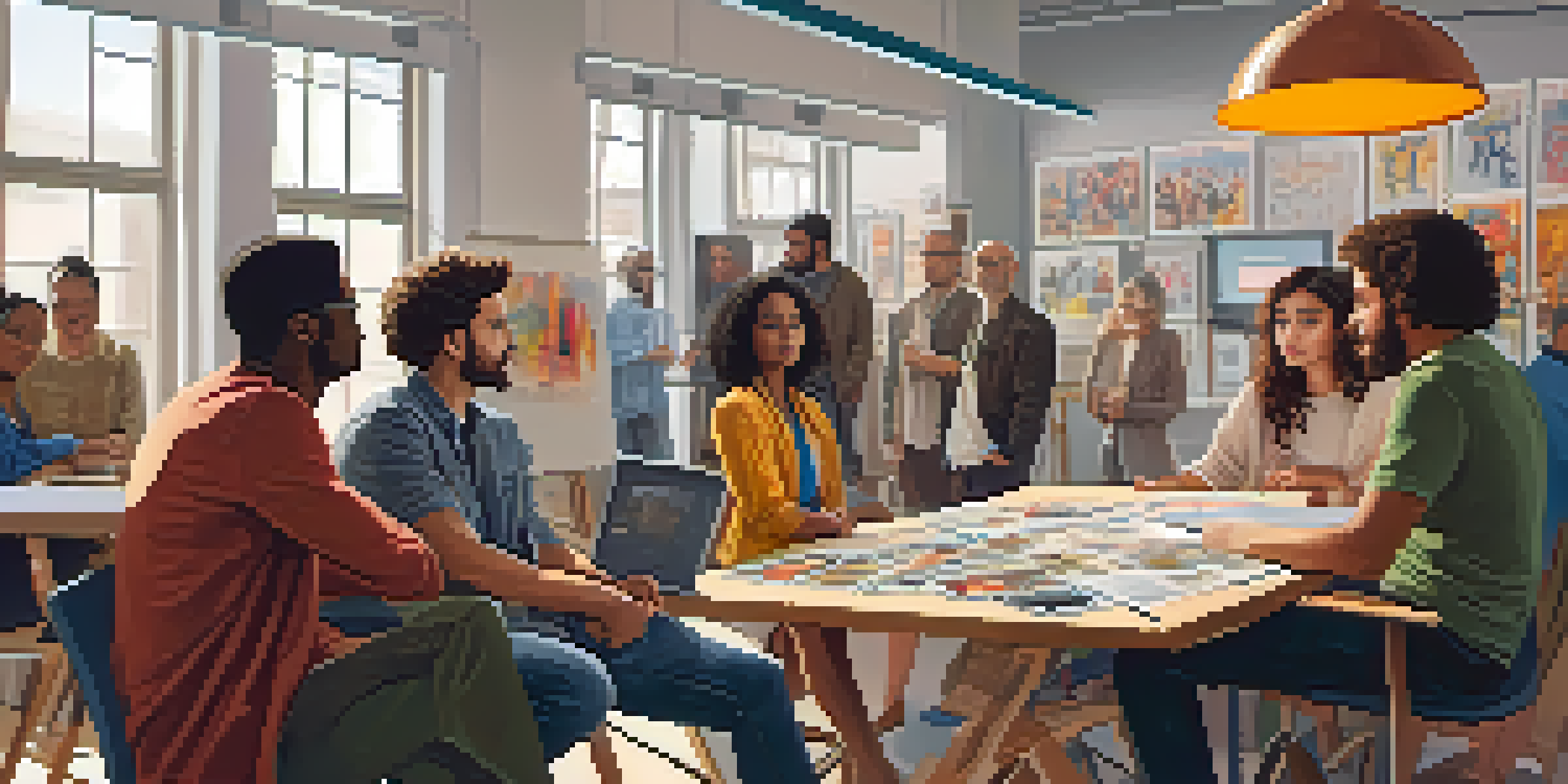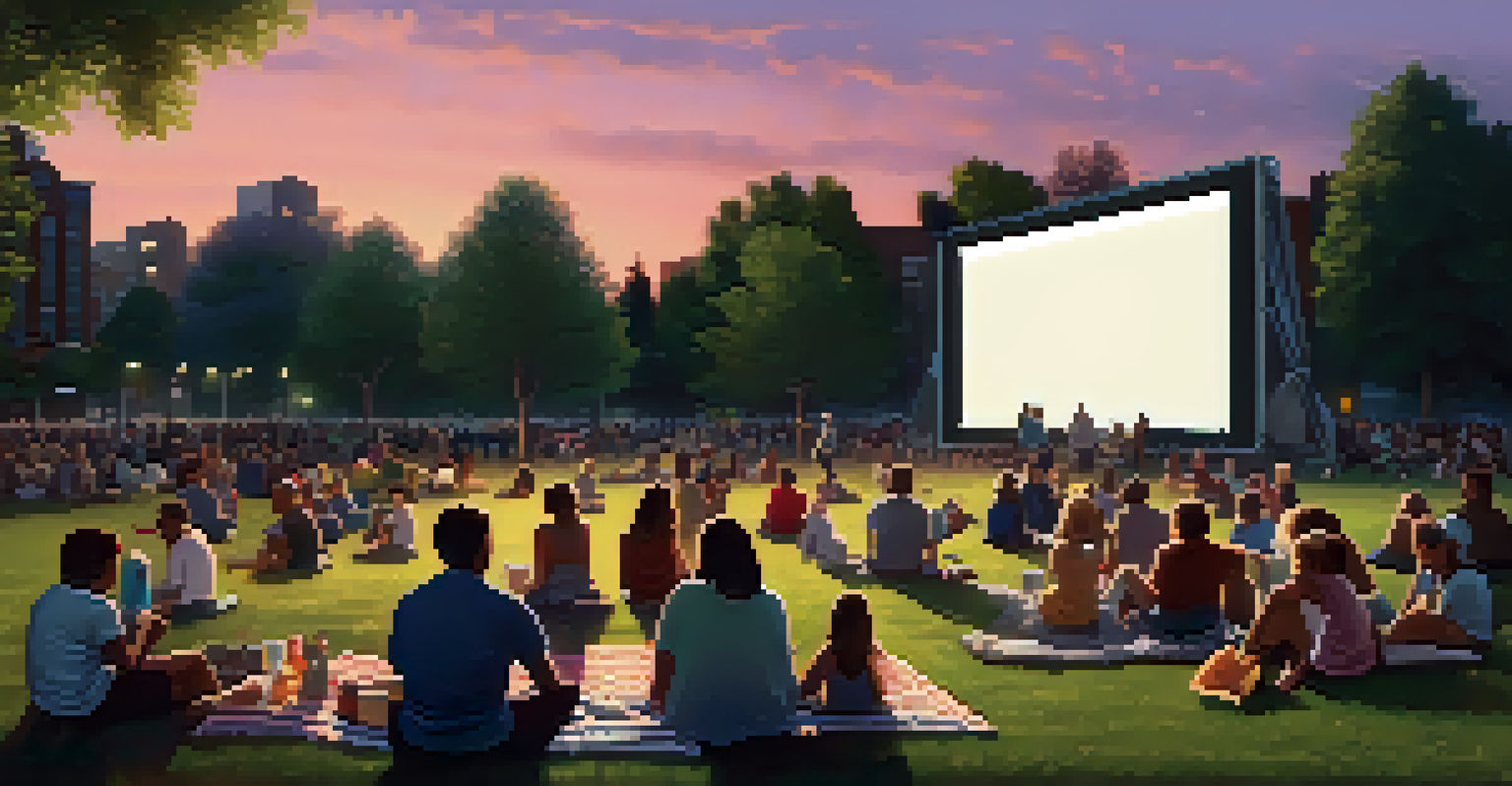Narrative Control: How Films Shape Political Realities

Understanding Narrative Control in Filmmaking
Narrative control refers to the power filmmakers have in shaping stories that influence public perception. Through carefully crafted plots and character arcs, films can present specific viewpoints and cultural narratives. By choosing what to include or exclude, filmmakers create a lens through which audiences interpret complex political realities.
The power of film is to make us reflect on our beliefs and to act on them.
This control is especially potent in the realm of politics, as films can evoke emotions, challenge beliefs, and even alter societal norms. For instance, a powerful documentary can shed light on issues often ignored by mainstream media, prompting viewers to reconsider their stances. In essence, filmmakers not only tell stories but also guide public discourse.
As viewers engage with these narratives, they often internalize the messages conveyed, which can impact their understanding of political issues. This phenomenon illustrates how films serve as a reflection of society while simultaneously molding its perspectives.
The Role of Genre in Political Narrative
Different film genres can evoke varied emotional responses and influence political narratives. For example, action films often frame conflicts in a binary manner—good versus evil—simplifying complex political situations. In contrast, dramas may delve deeper into the nuances of political struggles, fostering empathy and understanding among viewers.

Documentaries, on the other hand, aim to present factual accounts of political issues, often challenging mainstream narratives. By using real footage, interviews, and statistics, these films can provide audiences with a broader context of political events. This genre plays a crucial role in educating viewers and promoting informed discussions.
Filmmakers Shape Public Perception
Through narrative control, filmmakers influence how audiences interpret political realities and societal issues.
Ultimately, the genre chosen significantly impacts how audiences perceive and respond to political themes. By understanding these distinctions, we can better appreciate the various ways films shape our political beliefs.
Case Studies: Films That Changed Political Discourse
Several films have left a lasting impact on political discourse, sparking conversations and even inspiring movements. For instance, 'The Hate U Give' addresses systemic racism and police brutality, resonating with the Black Lives Matter movement. Its portrayal of these issues ignited discussions across various platforms, highlighting the film's potential to influence societal attitudes.
Cinema is a mirror by which we often see ourselves.
Similarly, 'Schindler's List' has been pivotal in shaping perceptions of the Holocaust, serving as a powerful reminder of the atrocities of war. By humanizing the victims and showcasing the moral dilemmas faced by individuals, the film encourages viewers to confront their own beliefs about history and justice.
These case studies illustrate that films are not merely entertainment; they can be catalysts for change. As audiences engage with these narratives, they become more informed and active participants in political dialogue.
The Impact of Representation in Film
Representation in film plays a crucial role in shaping how political realities are perceived. When marginalized communities are depicted authentically, it challenges stereotypes and promotes understanding. For instance, films featuring LGBTQ+ characters have contributed to greater visibility and acceptance of diverse identities, fostering a more inclusive political landscape.
Conversely, misrepresentation can perpetuate harmful stereotypes and narrow perspectives. When films portray certain groups in a negative light, they can reinforce societal biases, making it challenging for audiences to empathize with those communities. This highlights the responsibility filmmakers have in crafting narratives that reflect the complexities of human experience.
Representation Matters in Film
Authentic representation in films challenges stereotypes and fosters understanding, impacting political beliefs.
By advocating for accurate representation, films can help dismantle prejudices and encourage viewers to reconsider their political beliefs. This demonstrates the profound impact storytelling can have on promoting social justice and equality.
The Role of Filmmakers in Political Advocacy
Filmmakers often use their craft as a platform for political advocacy, raising awareness about pressing issues. Many directors and writers infuse their work with messages that challenge the status quo, using narrative control to spark conversations. This deliberate approach allows them to reach wider audiences, influencing public opinion on critical topics.
For instance, directors like Ava DuVernay and Jordan Peele have utilized their films to address racial injustice and social inequities. Their storytelling not only entertains but also educates viewers, encouraging them to engage with societal issues. By blending entertainment with advocacy, filmmakers can inspire audiences to take action.
Ultimately, the role of filmmakers as advocates is pivotal in shaping political realities. Through their narratives, they can mobilize viewers, encouraging them to reflect on their beliefs and fostering a more engaged citizenry.
Audience Reception: How Viewers Interpret Political Films
Audience reception plays a vital role in how films shape political realities. Each viewer brings their own experiences and beliefs to the viewing experience, influencing how they interpret the narrative. This variability underscores the idea that films can evoke diverse reactions, sparking conversations that extend beyond the screen.
For example, a film addressing immigration might resonate differently with viewers based on their personal experiences or cultural backgrounds. This unique interpretation can lead to meaningful discussions, as audiences share their perspectives and challenge one another’s views. Such engagement highlights the potential of films to act as platforms for dialogue.
Audience Engagement Drives Dialogue
Viewers' unique interpretations of films can spark meaningful discussions and reassessments of political views.
As audiences reflect on the narratives presented, they may reassess their political beliefs and engage more actively in societal issues. This demonstrates the powerful interplay between film and audience, emphasizing the importance of narrative control in shaping political discourse.
The Future of Political Narratives in Film
As society evolves, so too will the narratives presented in films. With the rise of streaming platforms and increased access to diverse storytelling, filmmakers are challenged to explore complex political issues more deeply. This shift may lead to richer narratives that reflect the multifaceted nature of contemporary politics.
Moreover, the growing demand for authentic representation means that filmmakers must prioritize inclusivity in their storytelling. By amplifying underrepresented voices, they can create a more accurate portrayal of society, which in turn shapes political realities. This evolution in narrative control can foster understanding and empathy among audiences.

Looking ahead, the future of political narratives in film holds great promise. As filmmakers embrace their role as narrators of societal change, they will continue to influence public perception and inspire action in the political landscape.